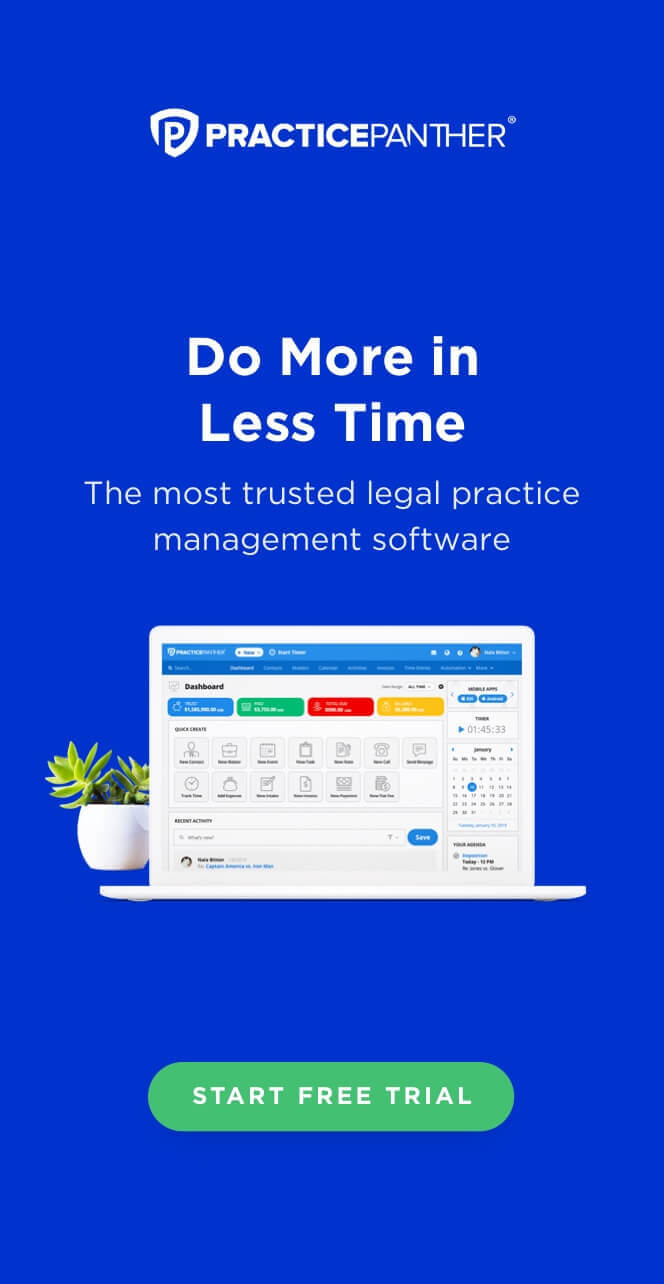Law firms face more complex accounting and billing challenges than many other industries, largely because of how they track billable hours. Such complexity stems from the need to maintain precise records of different rates, retainers, and the time spent on each client.
This is not an easy task, and with the strict ethical requirements in the legal world, there’s little room for error. Thankfully, law firm management software can be a huge help. Legal billing software, for example, gives firms a way to better track their intricate, ever-changing time allocation — all through time tracking features, custom reports, detailed analytics, and advanced sorting capabilities.
For a law firm, legal billing services are one of the most helpful types of legal software out there — but it’s important to know what to look for. Keep reading to learn more about what time tracking software lawyers use, and why the all-in-one solution, PracticePanther, is the best billing software for solo lawyers, large firms, and everything in between.
Before jumping into what to look for, let’s take a moment to break down the importance of law firm billing.
Why Does Billing Matter to a Law Firm?
Accurate, efficient billing methods are invaluable to any law practice. By using sound accounting practices, a law firm can:
- Maintain legal compliance and high operational standards.
- Enhance clarity and accuracy in time tracking and billing.
- Strengthen client trust and firm reputation.
- Optimize resource allocation and financial management.
- Save time and money — which means more time and money spent on practicing law.
However, the complex nature of billable hours makes it challenging to keep things organized. Thankfully, technology has helped dramatically with streamlining the billing process, allowing for more ways to track time, much quicker calculations, and overall better methods of organizing data.
To quote the American Bar Association (ABA), “the onset of the pandemic certainly accelerated lawyers’ use of technology, both in how they practiced as well as [keeping] their practices safe and secure from threats.” Technology has also helped with time tracking, pulling analytics, expediting billing description creation, and so on.
With this rise in technology also comes solutions tailored to law firms specifically. In today’s world, case management software perfectly suits the challenges of practicing law, including billing. The right legal software can monitor a firm’s cash flow with a system that, quite literally, accounts for all the variables of a law practice.
A solution like PracticePanther, for example, gives firms a way to track their time, organize tasks, and manage the whole billing lifecycle. All of these features not only help with running a good business, but create better relationships with clients and foster a less stressful work environment overall.

How Do Law Firms Track Billable Hours?
Most lawyers and law firms today either use spreadsheets or case management software to track their time — and case management software is becoming the go-to method. The ABA reported that by 2023, the majority of law firms (63%) were using legal software of some kind. This figure has been climbing since 2019, and for good reason.
When technology became more common, law firms initially used spreadsheets as a step up from handwritten notes and tracking. In this case, legal professionals record start-stop times and billing descriptions into a chart, then run formulas to determine the final amount they invoice their clients.
While this manual method might be sufficient for small caseloads, it quickly becomes complex to maintain with multiple clients, all of whom may have different rates and fee arrangements. And, as most lawyers know, the work day is not usually as simple as, “Monday I work on Client A’s matter, then Tuesday is Client B’s.” It’s much more like, “I’m meeting with Clients A and B today, but I also need to prepare documents for Clients C and D, and Clients E and F will likely call in…” and so on.
The above experience is why firms are adopting legal billing and accounting software. For firms that use this software, the process of time tracking, invoicing, and collecting payments is far more streamlined — all things desperately needed to keep a law firm running smoothly.
Rather than recording time manually, legal professionals can use a time tracking app that is for lawyers specifically, designed with their workload in mind. For example, instead of reinventing the wheel with every invoice, a firm can create reusable legal invoice templates they can come back to time and time again.
Additionally, paralegals may handle some of the billing duties for a law firm. Let’s look at how these shared responsibilities typically work.
What Are Paralegal Billing Duties?
Billing duties for a paralegal will vary depending on the size and structure of the law firm they work for. At a smaller practice, for example, a paralegal may be responsible for the entire lifecycle of billing. Conversely, a larger firm may have a dedicated billing department and not need its paralegals to help with billing aside from submitting their own time. Paralegals may be responsible for any number of billing tasks, from calculating payments to sending out invoices — but again, the specific duties will vary from firm to firm.
While billing can be a complex task for law practices, most firms will use some form of case management software to simplify the process. Legal accounting software helps with this process by providing a simple way to organize billable hours and create descriptive, thorough invoices.
Additionally, by centralizing billable time in one location, this kind of software eliminates the risk of duplicate entries or reliance on outdated information, thereby enhancing efficiency and transparency in billing practices. Such a benefit is incredibly important when you have multiple people (i.e., an attorney and a paralegal) entering time on the same case.
As you can see, the integration of technology into billing processes significantly aids paralegals in managing their billing duties, especially in environments where they are responsible for overseeing the billing lifecycle.

What Do Lawyers Use in Court to Track Time?
When in the courtroom or any out-of-office scenario, time and billing software helps legal professionals bridge the time tracking gap. Much of practicing law is spent on the move, which means there isn’t always time or space to sit down and track time on a spreadsheet in the office. But rather than resorting to makeshift methods, you can use a mobile-friendly platform to ensure you always have access to your time tracker. You’ll spend less mental energy remembering details for billable hours, leaving more time and space for focusing on the task at hand.
Software like PracticePanther even has a multiple-timers feature to easily track time spent on different cases. Having multiple timers makes it much easier to switch from one billable task to another; all you need to do is simply start a new timer, and your current timer will pause. When you’re ready to switch to a different task, start the relevant timer in the timer sidebar. You can also add a time entry manually if that is your preferred method of timekeeping. All of these features are available via desktop or mobile device.
Features like these cut out much of the time spent manually accounting for billable tasks and make work more fluid. You can also keep a more organized, accurate record of how you’re working, no matter where you’re working.
What Software Can I Use To Make Invoices for a Law Firm?
Legal practice management software is the best choice for law firm invoicing. Since billable hours create a complex web of tasks and invoice needs, it’s better to use software that combines case management with legal billing. Having this combination of features in one platform helps law firms stay organized, allowing them to provide the best service possible.
One thing to keep in mind is that most practice management software integrates with an external invoicing solution, which, unfortunately, means you have to pay for two software solutions to manage cases and finances. This is the problem that PracticePanther solves.
PracticePanther is the only all-in-one solution for practice management. It covers not just invoices but time tracking, analytics, and customizable features to streamline your firm’s workflow. By using PracticePanther’s custom tags and detailed reporting, you get better insights into your practice — from what practice area is bringing in the most money to where you’re spending the most time.
If your firm is seeking software for creating invoices, ask the following questions about your options:
- Does this software account for the complex, nuanced nature of billable tasks?
- Can I get detailed, accurate readouts of time spent and task descriptions?
- Am I able to customize and adjust the invoices to better fit how my firm practices?
- Does this invoicing software also give me helpful, actionable business insights?
- Will this software automate rote, repetitive tasks like following up on invoices?
- How intuitive is this software to use in my firm’s day-to-day workflow?
- Can I access this software when I’m out of the office — for example, on a mobile device?
- Do I need other software solutions to optimize this one, or does it work on its own?
Any case management software worth its salt will meet each item on this list. And as a business, it’s important to implement not just any technology, but the right technology: something that’s going to integrate with your practice and make your caseload simpler and more efficient to manage.

Which Software Is Best Suited to Track Attorney Time, Calculate Charges and Costs, and Create Statements and Invoices?
When looking for software options, some might consider general accounting software — but this is a mistake. Most accounting software doesn’t, for lack of a better word, account for much of how law firms do their billing. General software is not equipped to handle billable hours, time tracking, and much of the minutiae inherent to the practice of law. Legal-specific software, on the other hand, is designed with attorney workflows in mind. And for the best in legal-specific software, look no further than PracticePanther.
As the only all-in-one solution for case management software, PracticePanther gives firms the help they need and the insights they want, all at a price they can afford. It covers all aspects of a law firm’s workflow, no matter your size or practice area. Here are some highlights of using a top-tier platform like PracticePanther:
- Intuitive, easy-to-use time and expense tracking that is mobile-friendly
- A single source of truth for invoices and billable hours
- Automation features to support the entire billing lifecycle
- Custom tagging capabilities to organize workloads or denote special cases
- Business reporting, insights, and analytics that you can’t get from a spreadsheet
PracticePanther incorporates flexible, mobile-friendly time tracking to let attorneys more easily monitor their workflow — both in and out of the office. All that data compiles into a neat invoice with your law firm logo that you can send directly to clients from the platform.
On top of all that, clients can pay their invoice on the platform via PantherPayments — no external payment processor required. In just a few seconds, clients can securely pay through their client portal or a link via text and email. PracticePanther even helps you follow up on collecting payments through automated reminders to your clients. The only thing this software doesn’t do for you is, well, practice law — which you’ll have all the more time and energy for.
What Is the Best Software for Billing and Time Tracking?
It’s no contest: an all-in-one case management software is the best way to go for law firms. A spreadsheet might have been fine in the past, but for lawyers today, it’s mission-critical to have software that works with their practice.
But keep in mind that not all legal software is created equal; few have all of the features and flexibility that the practice of law requires. And only one software provides an all-in-one solution: PracticePanther. Our software makes time tracking easier and gives you more ways to gain insights into your practice. We bring everything together that a law firm needs from their software — not just billing and time tracking, but case management, calendaring, trust accounting, and more.
For law firms of all types and sizes, PracticePanther is the best case scenario. See why for yourself, and sign up for a free trial or a free demo today.





